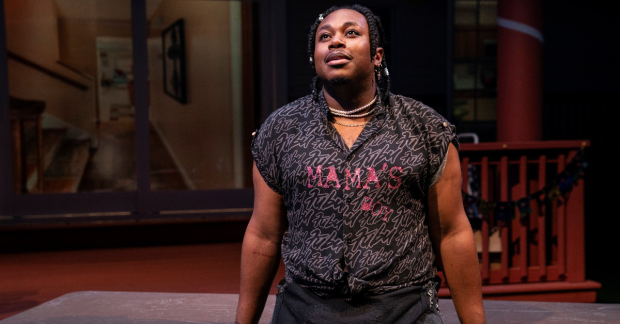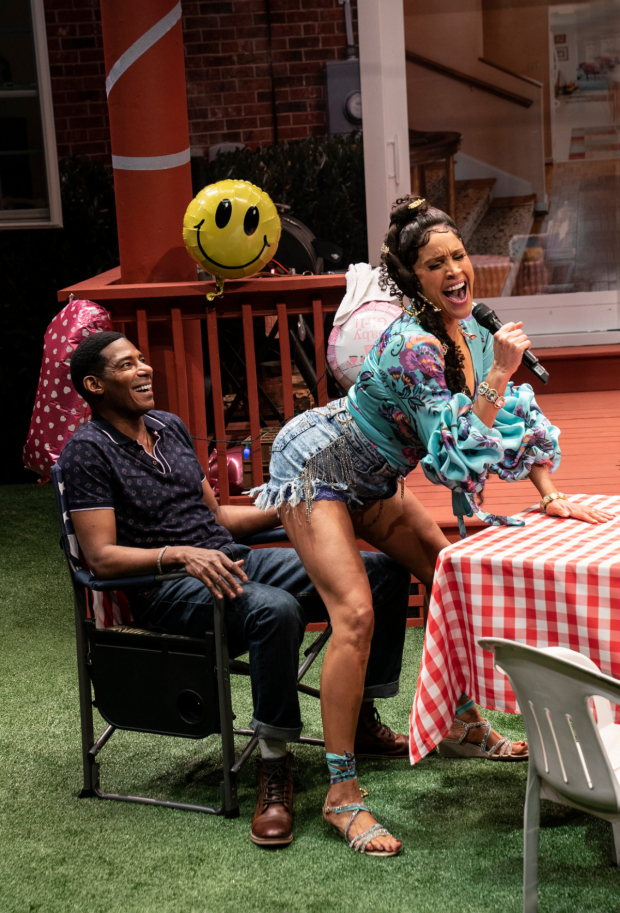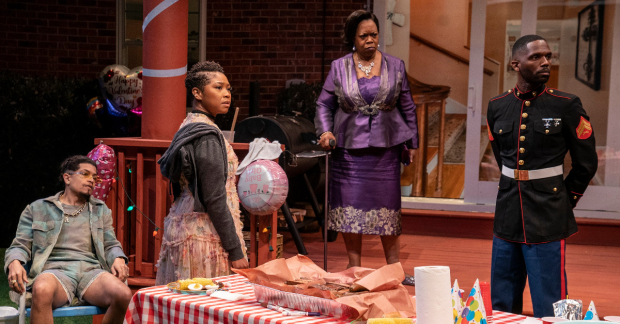Review: Pulitzer-Winning Fat Ham Serves Up Shakespeare With a Tasty Rub
James Ijames’s riff on ”Hamlet” is making its New York City premiere at the Public Theater.

(© Joan Marcus)
Critics are currently in the unique position of writing reviews for two shows that received Pulitzer Prizes for Drama, Michael R. Jackson's A Strange Loop and now James Ijames's Fat Ham. Writing about a piece that has already received such a prestigious honor is both a joy and a difficult task — what more can we add to a show that has already received such high praise? Thankfully, there is so much to love in both.
Fat Ham, a loose retelling of Hamlet, is an adaptation that does not care about fidelity, nor really about Shakespeare for that matter; the playbill even tells us "this ain't Shakespeare." This disavowal may seem blasphemous, but it allows Ijames to take Hamlet in directions it has never gone, letting the play become a vehicle for something new, something, dare I say, even better.
In Ijames's hands, Shakespeare's text about a brooding, fake-mad, mother-obsessed, father-avenging prince of Denmark becomes a play celebrating Blackness, specifically radical Black queer softness. In Ijames own words, it raises up a Blackness that is "traditional and weird and lonely and happy and grieving and honest and frightened and brave and sexy and churchified and liberated and poetry."
The setting here is a backyard with a porch, which serves as the stage (quite literally) for a funeral, a wedding reception, a barbecue, charades, karaoke, family fighting, coming-outs, and soliloquies. Ijames makes deft use of Shakespeare, such that all the major characters and plot points are there and the play is dramaturgically very similar, such that you can always generally tell where you are in the Hamlet multiverse. Occasionally though Ijames has moments that do conjure up the original text, either with tongue-in-cheek references (like the rub being on meat for the barbecue) or meta moments where Juicy (Marcel Spears), our Hamlet-equivalent, grabs a microphone and gives a direct Shakespeare monologue to the audience.

(© Joan Marcus)
The piece is extremely self-aware of itself, its status as a playful and political adaptation, and as a play: the characters break the fourth wall and even interrogate each other on what they've been telling the audience about each other. It's a perfectly fitting homage, since Hamlet has always been deeply interested in meta-theater.
There are many shifts within the piece, be it ghostly entrances or direct addresses to the audience, that are gorgeously achieved through Stacey Derosier's lighting (complete with some stunning Edison bulbs). While Maruti Evans's set leaves a bit to be desired, this seems mostly like a limitation of the small venue, and it is easy to imagine what a more fully rendered version of this set would look like. The real star of the production team, though, is prop manager Claire M. Kavanah. This is a play of props: endless streams of Black Southern BBQ foods, hodgepodge dollar-store decorations, mismatched chairs and folding tables all combine to dress the set in ways that make it a spectacle of 21st-century naturalism.
Much has been said lately about how it is the ensemble as a unit that is doing the best work onstage right now (For Colored Girls, Six, English, POTUS, and more), and Fat Ham is a prime example. Marcel as Juicy, Nikki Crawford at Tedra (Gertrude), Billy Eugene Jones as Rev/Pap (Claudius and Hamlet Sr.), Adrianna Mitchell as Opal (Ophelia), Benja Kay Thomas as Rabby (Polonius), Calvin Leon Smith as Larry (Laertes), and Chris Herbie Holland as Tio (Horatio) all give impeccable performances. It is hard to single any of them out, since they each are perfectly cast and give first-rate performances; there is not one weak link among them.

(© Joan Marcus)
Marcel's Juicy is yearning, frustrated, and passionate. Crawford's Tedra is loving and maternal but complicit in the various aggressions toward her son. Eugene's Rev is vile in all the right ways. Thomas's Rabby is spiritual and judgy, but down for fun. Smith and Mitchell strike tender tones as siblings who are both going through journeys with queerness and identity. They combine in ways that feel lived-in, as if this was a cast of a long-running sitcom whose actors are familiar with each other and their characters have already had endless interactions.
I don't want to spoil the ending, but will simply say that it is quite the coup — genius and touching and political all at once, for it is radical to think about Hamlet beyond tragedy. The trope of a straight play having a single, bold set change for the final moment and ending with a joyous group song has become an overused trope. Here, however, these devices are not only wholly justified but also are firmly within the dramaturgy and message of the piece. This is, after all, supposed to be a celebration.
Together, Ijames, director Saheem Ali, and the cast have created something momentous and remarkable. It is without a doubt my favorite Shakespeare adaptation; I even prefer it to every Hamlet I have ever seen. Placed alongside Kenny Leon's revelatory all-Black Much Ado About Nothing and Jocelyn Bioh's joyous Merry Wives (also directed by Ali), Black interpreters of Shakespeare have proved that the Bard's plays not only can still be relevant, but that they also can be very successfully stretched and adapted to Black culture in ways that let Shakespeare's texts do more than they ever could. By placing Fat Ham in the contemporary South, putting it in a modern vernacular, strategically utilizing, bending, and at times even rejecting the original text, Ijames is able to explore Blackness, queerness, identity, and legacy with powerful nuance and finesse. It is a masterpiece, and its Pulitzer is well-deserved indeed. Join the barbecue before everyone else shows up, you'll be glad you did.










